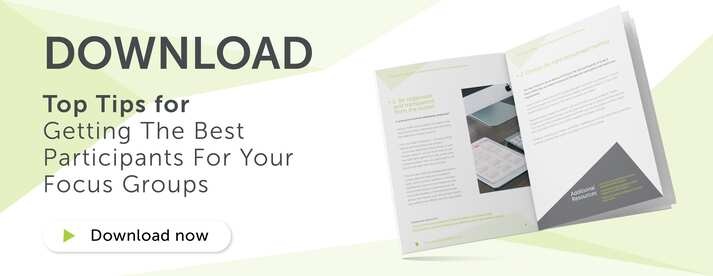
Types of Qualitative Market Research + Recruitment Tips
Choosing the right qualitative market research method can feel overwhelming — especially if you’re new to the world of market research. With so many options available, how do you know which approach is best suited to your goals, audience, and budget?
In this beginner-friendly guide, we’ll break down the most common types of qualitative market research methods, from focus groups and online communities to ethnography and in-home interviews. Whether you’re aiming to dig deeper into customer behaviours or explore new product ideas, this guide will help you understand which method fits your project — and how to make it a success.
We’ve put together a breakdown on the most popular types of qualitative market research, to help you decide which one is best suited to your research project.
1) Focus Groups
Focus groups involve a number of participants, normally between 6-10. They facilitate an open discussion and allow moderators to probe for further insights, which can improve your product and service. Although focus groups are a popular choice when it comes to market research, there are a few things that need to be considered when utilising this research method. For example, considering the type of venue where the focus group will be hosted. The choice of venue is usually based on the type of research that is taking place, but as a general rule, the venue you select should be easy to locate and easy for your participants to travel to.
A common venue for this type of qualitative methodology is a market research viewing facility. These facilities are great for focus groups as they enable the client to watch the session too without the participants feeling uneasy due to the use of a one-way mirror at the facility. These viewing facilities also come with full video and sound recording capabilities, which makes transcription a lot easier.
No matter what type of venue you select for your research, it should be private, quiet and free from distractions. This will help to ease your participants into the focus group and ensure that they feel comfortable, hopefully aiding in the depth of their responses. In our experience, we have found that conference rooms at hotels can seem to work well for focus groups, although, it all depends on the budget that you have available to you.
2) Market Research Online Communities
With the rise of digital-first generations like Millennials and Gen Z, market research online communities (MROC) have become even more valuable for engaging these tech-savvy audiences. These online communities are built using intelligent software that enables you to conduct a private community. There are several types of MROC software available, but it must meet your research needs. For example, does your software need to be mobile friendly? Do any security measures need to be put in place? Should the software be an app or via mobile website? These are all things that need to be considered when selecting software for your MROC.
During a market research online community, participants can discuss various topics and tasks on the forums or post videos. Varied discussion is the largest benefit of online research communities. In our experience, we have found that discussion forums work particularly well as a task in an MROC as they facilitate in-depth, interactive discussion among participants in a closed community. We’ve also found that blogging works well as a market research online community task as it enables participants to create digital diaries of their everyday lives including images, videos and text. This helps to gather a detailed in-depth understanding of participants from the information that they upload.
To help boost engagement in MROCs, especially with digital-first generations, incorporating short-form video responses, gamified tasks, and authentic interactions can make a big difference. For more ideas on improving engagement, check out our blog: Top Tips for Engaging Respondents in Qualitative Market Research.
3) Online Focus Groups
While traditional focus groups are one of the most effective ways to gather qualitative market research data, they can sometimes be difficult to facilitate - especially if you know that your target demographic for the research lives in more remote areas or you don’t have the budget to cover flying to do focus groups in all of your target country markets.
This is where online focus groups help researchers. Users are given login details and participants can be interviewed via webcam. You also have a larger pool of participants to choose from, which is particularly useful if you’re conducting research on a global scale or you have a niche audience. In our experience, we have found that a group size of 4 or 5 usually works best for online focus groups.
Modern online focus group platforms such as Zoom, FocusVision, or Lookback allow for flexible, secure sessions with features like real-time note-taking, recording, and virtual observation rooms. Always ensure compliance with data protection and consent standards such as GDPR when conducting online research.

4) Ethnography
Ethnography – the study of people in a real-world environment – can give a more accurate picture than a self-complete questionnaire. Ethnography enables researchers to embed themselves in the world of the subject that they are studying. Traditional ethnography is generally conducted by the researcher spending time with participants. This could be observing participants at home, work or in a social setting to understand how people interact in these environments or with specific products or services. In regards to products and services, other ethnography techniques include directly speaking with participants about their experience. Usually, this means participants elaborate their thoughts and motivations on the product or service. This method of ethnography can uncover further detail that may not have been first noticed by simply observing participants and can prove to be valuable for ethnographic research.
In addition to traditional ethnography, there is also growing trend toward using digital ethnography, where computers and mobile devices are used to gather research data. For example, mobile diaries allow researchers to capture experiences as they happen and as mobile tech continues to proliferate digital ethnography, it has the added benefit of reaching a larger audience.
Some researchers now use wearable tech or AI-enhanced software to help capture real-time behavioural data, making ethnography even more immersive and scalable.
Although there are many benefits of both traditional and digital ethnography there are many considerations to bear in mind when approaching this style of qualitative market research. For example, you can’t just film someone and observe them at work, you need their consent before you can commence the research.
The incentives for ethnographic research will also need to be considered carefully due to the nature of the research. As this style of market research is fully immersive and is extremely time-consuming for participants they will need to be reimbursed to reflect this accordingly. From our experience, we have found that cash incentives work best for this research methodology.
5) Telephone Interviews
Researchers use telephone interviews to gather quantitative and qual market research data. For qualitative data, researchers use a discussion guide instead of a structured interview. This will allow participants to elaborate when necessary but will ensure that they do not deter too far from the questions outlined in the discussion guide.
There are many benefits of telephone interviews, the main benefit being that you can interview geographically dispersed participants at a lower cost.
It’s also worth noting that with the decline of landlines, mobile-first recruitment strategies and scheduled call apps are now more commonly used in telephone interview research.

6) In-home Interviews
In-home interviews are a great methodology to gather invaluable insight into participants home lives that can’t always be achieved via other methodologies. By conducting research in participants natural environments you may be able to gather valuable insights into their behaviours. Something which can’t be achieved from traditional research settings.
Another benefit of conducting research in participants homes is that the respondent is generally at ease. As the research is in the comfort of the respondent's homes the participant is usually more relaxed and comfortable. This comfort can often lead to respondents being more forthcoming with their responses, offering deeper insight.
In addition to this, children are more likely to be able to participate in-home interviews. Parents usually feel more comfortable with their children taking part in research at home as they are there to observe. Also, conducting qualitative market research in a child’s own home means that they are familiar with their surroundings and relaxed which could help them to open up more. (Don't miss our blog on the essential role parents play in qualitative market research.)
Although there are many benefits for in-home interviews, it comes with its own set of complications to consider too. Often this methodology is time-consuming due to the logistics of the type of research as your ideal sample could live nationwide meaning additional travelling is required. This travelling time is in addition to the duration of the research which could be between 60-90 minutes. Not only are in-home interviews time-consuming but they are also expensive to conduct, especially when you factor in the cost of travelling.
In some cases, researchers are now combining in-home interviews with online elements, such as virtual tours or video submissions, to reduce costs and improve accessibility. When using these hybrid methods, it’s essential to ensure participants fully understand and agree to how their data will be collected and used—which is where comprehensive consent forms come in. If you're unsure what to include, check out our blog post on consent forms.
Overall your choice of market research methodology is dependent on what your research is trying to achieve, your budget and your sample. We hope that you have found our guide to selecting the right market research methodology for you useful.
If you would like more information on how to recruit the best participants for focus groups or other research methodologies then download our guide below!
If you're looking for a trusted qualitative market research agency to support your project, we’re here to help.














